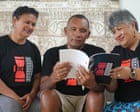The Pacific is facing a “critical moment” for press freedom, the region’s media watchdog has warned, as a number of senior journalists in a range of Pacific countries are facing costly lawsuits and criminal prosecution for alleged defamation.
“We have seen a few cases coming up … challenging the fundamentals of press freedom in the region,” said Robert Iroga, the chair of the Pacific Freedom Forum.
Iroga said that Pacific countries – while all distinct and with separate laws governing media – often face similar cultural and economic challenges that affect press freedom.
These include the fact that news outlets are often small with very limited budgets, which means defending lawsuits brought against them can often bankrupt an outlet.
Concerns have been raised about press freedom in some Pacific countries in recent years, including in Solomon Islands, where the former prime minister Manasseh Sogavarereportedly threatened to ban foreign journalistsin 2022 if they were not “respectful” in stories about the country’s ties with China, and in Papua New Guinea where reporters have been suspended over theircoverage of certain political stories. Papua New Guinea is the lowest-ranked Pacific country – 91st in the world – when it comes to press freedom, according to the Reporters Without Borders Press Freedom Index 2024.
“It limits the ability of a journalist to report, knowing that if they enter into a legal suit, that might destroy the company, because they don’t have money to fight those legal suits which are very expensive,” Iroga said.
“This is a critical moment for us in the Pacific,” he said. “Threats have slowly been creeping in, eroding the freedom of the press.”
Among those facing legal action are Leilani Reklai, the publisher of Island Times newspaper in Palau, and the deputy chair of the Pacific Freedom Forum.
She is being sued for defamation by Surangel and Sons Co, a company owned by the father of Palau’s president, Surangel Whipps Jr, for an article she published last year about the company’s tax affairs.
The company alleged in a statement that Reklai’s article contained “false and unsubstantiated allegations against the company” constituting “negligence and defamation”. Reklai denies this.
Reklai’s case is still in the discovery phase and so far she says it has cost her $10,000 in legal fees. She has been told her fees could end up being five times that amount. In Palau, the average salary for a journalist is approximately $9,500 a year before tax.
To fund the suit, the local media community has engaged in fundraising for her, but she says her family and her clan may have to sell land to pay the rest of the bill.
“It’s stressful financially and emotionally. But it’s not something that we can afford to just drop or compromise on,” she said. “Everybody’s watching this, reporters are watching this, our community as a whole is watching it to see what message is coming out at the end of the day.”
Speaking generally about the challenges of reporting in the Pacific, Reklai said that because communities are often quite small and Pacific cultures often put a premium on respect for authority and reputation, there can be a tendency toward self-censorship.
“[There is] a pressure to report only what is acceptable or not culturally or politically too sensitive. There is that sort of self-censorship… because we know everyone, we are related to everybody in this whole community,” she said.
This concern for reputation was a key factor in the re-criminalising of defamation in Samoa in 2017, which means that someone found guilty of defamation could face up to three months in jail.
Lagi Keresoma, a veteran journalist at Talamua Media and the president of the Journalists Association of (Western) Samoa (JAWS), is now charged with criminal defamation for a story she wrote in May.
Keresoma, who is due to appear in court later this month on the charges, says she will plead not guilty.
“As the president of the media association here, I cannot bow down and set a bad example for others. If I have to go to jail on this one, I’ll take it, but I’m not going to apologise for something [when] I believe there was no wrong in it.”
In Papua New Guinea defamation is also a criminal charge, carrying a penalty of up to 25 years.
The Pacific Freedom Forum has launched a fundraising appeal to raise money for the defence of these – and other – Pacific journalists facing lawsuits.
“It’s quite scary, because some of them, if they lose these court cases, it’s basically the end of their business and that will be very sad a chapter for the media industry in this region,” said Iroga.
“Regardless of the challenges we face, we are determined across the region to defend press freedom, to defend democracy.”
